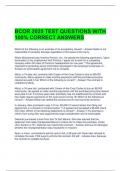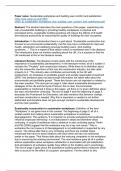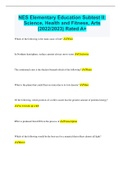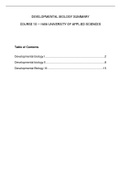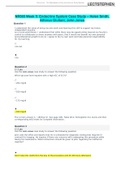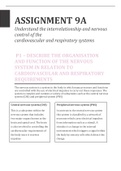100% CORRECT ANSWERS
Which of the following is an example of an exculpatory clause? - Answer-Seller is not
responsible for property damage regardless of the cause of the injury.
When Mohammed was hired by Pomico, Inc., he signed the following agreement, "Upon
termination of my employment with Pomico, I agree not to work for a competing
company within 30 miles of Pomico's headquarters for one year." This agreement,
important to protecting secret information developed in the employer's business, is: -
Answer-an enforceable agreement not to compete.
Marty, a 16-year-old, contracts with Cream-of-the-Crop Cycles to buy an $8,000
motorcycle. Marty agrees to make monthly payments until the purchase price plus
interest are paid in full. Which of the following is correct? - Answer-The contract is
voidable by Marty.
Marty, a 16-year-old, contracted with Cream-of-the-Crop Cycles to buy an $8,000
motorcycle. He agreed to make monthly payments until the purchase price plus interest
were paid in full. It is three years later and Marty has not disaffirmed the contract and
has made regular payments on the cycle since turning 18. Which of the following is
correct? - Answer-Marty has ratified the contract and is now bound by its terms.
In January, Alex promised to pay Y-K Inc. $5,000 if it would refrain from filing suit
against him on a breach of contract action. Y-K agreed and accepted a $5,000 check
from Alex. Which of the following statements is correct? - Answer-Y-K's promise to
refrain from suing Alex was supported by legal consideration and is enforceable.
Deborah purchased a boat from Sun 'N Surf Marine. She later learned that the
salesman had made misrepresentations to induce her to make the purchase. Under
UCC Section 2-721, Deborah can rescind the contract: - Answer-and sue for damages
whether the misrepresentation was fraudulent or innocent.
Ryan, a minor, contracted to sell his auto to Ed, a 28-year-old. Ryan later refused to
complete the sale. If Ed sues to enforce the contract, Ed will: - Answer-lose, because
the contract is voidable by Ryan.
, Mentally infirmed Sasha contracts to purchase a piano for $2,500 in 60 monthly
installment payments. Six months later she tries to void the contract on grounds of
mental impairment. A court will: - Answer-normally void the contract but will require
Sasha to return the piano.
If Becky promises not to drink alcohol until she becomes a legal adult in exchange for
Ben's promise of $1,000, the agreement is: - Answer-not enforceable because Becky
does not have a legal right to drink alcohol.
Claude agrees to lease his house to Irvin for nine months, the lease to begin six months
from the signing of the contract. Under the statute of frauds: - Answer-the lease is
required to be in writing because of the one-year rule.
Under a contract for the sale of land, the statute of frauds: - Answer-requires the
defendant to sign the agreement.
Which of the following promises ordinarily must be in writing to be enforceable? -
Answer-All of the above.
Wally owns 200 acres of land. Wally offers to sell the land to Robert for $1,500 per acre.
Robert replies that he does not need 200 acres of land but would like to buy 40 acres at
$1,500 per acre. Wally agrees to sell but does not identify which 40 acres. Later, Wally
refuses to sell any land to Robert. What is the result? - Answer-Wally wins; this
agreement is too indefinite since it does not identify which 40 acres are to be sold.
Willis and Leslie orally agree to the sale of a parcel of land for $50,000: one-half
payable now as a down payment; one-half payable in 30 days at the time of closing
when the title will be transferred. The buyer, Willis, is to have possession immediately.
Willis pays Leslie $25,000, takes possession of the land, and starts building a house. At
the time of closing, Willis has made a substantial beginning on the house. However,
Leslie refuses to transfer the title, claiming the oral contract is not enforceable. This
contract is: - Answer-enforceable, because Willis has partially performed the oral
contract and made improvements on the land.
In order to satisfy the statute of frauds, a writing must: - Answer-be signed by the
defendant and contain the name of each party, the subject matter of the agreement, and
the essential terms and promises.
Which of the following is most likely to constitute fraud? - Answer-Silence as to a toxic
waste problem on real property that the buyer would not reasonably find.
When a party to a contract makes a unilateral mistake, the contract: - Answer-generally
cannot be rescinded by the mistaken party unless the contract is unconscionable or it is
proven that the nonmistaken party knew of the error.
Agreeing not to open a competing business could be consideration. - Answer-True

